Hollywood is so sexist.
How sexist is it?
Hollywood is so sexist that even though women make up a slim majority of ticket buyers they've accounted for less than a third of all speaking roles in movies each of the last two years, 2013 and 2014.
Huh. Maybe that's not so much explicitly sexist as it is simply an example of bad business, especially when 2013 gave us female-led hits like Frozen, Gravity and The Heat culminating with Hunger Games: Catching Fire becoming the first female-led movie to end a year as the top domestic earner since at least 1997's Titanic. Hollywood is, as Fast & Furious film franchise producer Neal H. Moritz said, "like one of those huge ocean liners that really take a long time to turn around." So, it's taken a little while to really see the effects 2013. Now on the heels of films like 50 Shades of Grey, The Duff, Cinderella and Pitch Perfect 2, 2015 has been dubbed the year of "girl-powered blockbuster" by Forbes' Scott Mendelson.
Much work is yet to be done. Less than 5% of studio films in 2014 were directed by women, and not one Oscar best picture nominee featured a female protagonist. The ACLU wants the government to investigate if anything can be done to ensure female directors an equal opportunity for film and TV gigs. There's a trending Tumblr page highlighting all of the sexist things male crew members have said to female directors. Sony is still repairing talent relations in a world in which we all know Jennifer Lawrence and Amy Adams were both paid less than each of the three guys (Christian Bale, Bradley Cooper, Jeremy Renner) in American Hustle. The drama surrounding the merchandizing and on-screen treatment of Scarlet Johansson's Black Widow in Age of Ultron isn't going away.
As a result, prominent actresses, be they appearing on a panel or out promoting a new project, are continually being asked to weigh in on Hollywood's sexism. Here are some of the best recent quotes:
Dianna Agron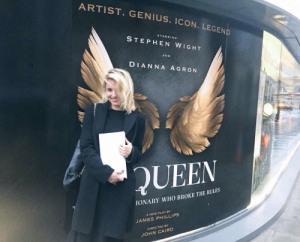 In an interview with The Daily Telegraph to promote the former Glee star's stage debut in McQueen on London's West End, the topic turned to Hollywood's sexism:
In an interview with The Daily Telegraph to promote the former Glee star's stage debut in McQueen on London's West End, the topic turned to Hollywood's sexism:
"Women are not paid anywhere near the same (as men) at all, and it's only getting worse. And just to be heard - so many times you see it with a female director, there's sometimes resistance from the male crew ... It's not just for actors, it's for hair and make-up and stylists and everything. Nobody wants to pay anybody any more [...]You'll be told, 'Well, we don't have the budget ... And you're lucky you're getting the exposure. You're lucky to be working with these people...' And that ball keeps rolling. So 10 years down the line you're like, 'Am I still lucky to be working with these people?'"
Geena Davis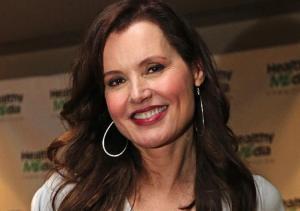 In a Hollywood Reporter op-ed explaining why she founded the Geena Davis Institute on Gender in Media:
In a Hollywood Reporter op-ed explaining why she founded the Geena Davis Institute on Gender in Media:
Jane Fonda:"Because I was fortunate enough to be cast in movies like Thelma & Louise and A League of Their Own, I developed a heightened awareness of how women are portrayed in media. Enough that when I started watching G-rated videos with my daughter about eight years ago, my "Spidey" sense caused me to immediately notice how few female characters there were in entertainments aimed at the youngest of children. Surely in the 21st century kids should be seeing boys and girls share the sandbox equally? [...]The basics are that for every one female-speaking character in family-rated films (G, PG and PG-13), there are roughly three male characters; that crowd and group scenes in these films - live-action and animated - contain only 17 percent female characters; and that the ratio of male-female characters has been exactly the same since 1946. Throw in the hypersexualization of many of the female characters that are there, even in G-rated movies, and their lack of occupations and aspirations and you get the picture."
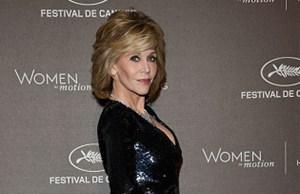 Appearing onstage and delivering an acceptance speech at the inaugural Women in Motion awards at the Cannes Film Festival:
Appearing onstage and delivering an acceptance speech at the inaugural Women in Motion awards at the Cannes Film Festival:
Heather Graham"This industry, our industry, is without doubt the most important cultural force in the world. It knows no boundaries. ... It's critical that women are at the heart of the international film industry, not just as glamorous icons but as creators, as artists, as decision makers, ensuring that the narrative - of not just half but 51% of the world's population - is fully represented. We women we see things differently, we experience things differently, we express things differently, we just do. And if our stories, our truths are not respected on that big silver screen then the women in those dark theaters are going to risk feeling that they are not seen and that they don't really matter that much. And the half of the world that is male will be robbed of half of reality."
 In an Esquire interview, Graham took a more "it is what it is" approach:
In an Esquire interview, Graham took a more "it is what it is" approach:
Salma HayekI'm not saying the movie business isn't sexist. It's totally sexist. If you look at all the movies being made these days, eighty percent of them are about men.
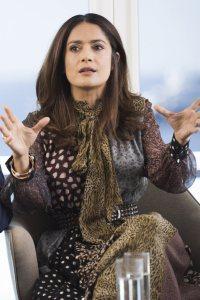 At The Hollywood Reporter's "Women in Motion" talks at the Cannes Film Festival:
At The Hollywood Reporter's "Women in Motion" talks at the Cannes Film Festival:
Scarlet Johansson"The only thing we can do is show them we are an economic force. Nothing else will move them. ... The minute they see money, things will be instantaneously different. ... Show them the money [...] The movie is industry is in trouble because we [women] don't care about their movies, and they're trying to figure out why. What would happen if there was an open door, and somebody started doing movies that we want to see? ... [The studio executives] think, 'Chick flicks, romantic comedies. Guess what? We're smarter than that [...]Most of the big stars in their contracts have approval of their leading ladies. The fact that he gets a say in who he gets to kiss I find is very sexist. ... And they do not like it when the female character is strong [...] People say, 'Wow, how is it working with a female director?' I'm like, 'What are you talking about? It's like working with a person.' [People ask,] 'Is it like a female look at violence?' I don't even know what that means."
Talking to The Los Angeles Times' Hero Complex on the marketing (or lack thereof) for Black Widow in Age of Ultron:
Anna Kendrick"I see it as a vestigial remnant of this kind of sexist sort of mindset. It's certainly nice that people are noticing and talking about it, whereas before it would just kind of be like, 'Well, you know, it's long pajamas and they're for boys, so of course it's all the guys on them.' It's a conversation that people are having - 'Where's all the girls? We want more. We want to see females in this genre who are not the stick in the mud or the damsel in distress or the girlfriend waiting by the window. We want to see characters who reflect the environment that we're a part of.'"
 In a cover page interview with Glamour magazine:
In a cover page interview with Glamour magazine:
Rose McGowan"All the films nominated [for a Best Picture Oscar] this year had male leads. Like, every single one. So I'm glad that [equality's] feeling like a bigger issue now [...]There's [a film I'm considering] now where I have to wait for all the male roles to be cast before I can even become a part of the conversation. Part of me gets that. [But] part of me is like, 'What the f-? You have to cast for females based on who's cast as males?'"
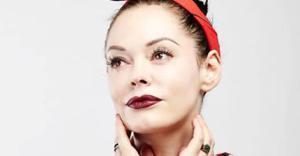 In a recent speech delivered to the Sisterhood of Travelling Producers, an invite-only group of young female producers and executives, McGowan outlined 7 steps you can take to overcome sexism in Hollywood, one of which was:
In a recent speech delivered to the Sisterhood of Travelling Producers, an invite-only group of young female producers and executives, McGowan outlined 7 steps you can take to overcome sexism in Hollywood, one of which was:
Kristen Stewart"Put female writers and directors on the TOP of your lists. Do it every time. If asked why, say why not, smile and walk away. Give them something to think about. It's about time to see women in films as equals. This is a simple way to start. Remember: Just because it's been done a certain way doesn't mean it should still be done that way. The sad fact is, Hollywood is out of date. Let's bring our town into the modern world. Dwindling ticket sales are a reflection of how largely passé Hollywood films are. Let's be better, let's do better."
 In a Harper's Bazaar UK interview:
In a Harper's Bazaar UK interview:
"Hollywood is disgustingly sexist. It's crazy. It's so offensive it's crazy. Women inevitably have to work a little bit harder to be heard."
There are those who see a bigger picture and argue gender discrimination is an issue facing all of society, thus making the plight of the Hollywood actress sadly indistinct from anywhere else:
Gillian Anderson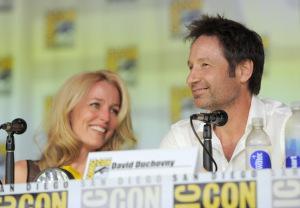 In an interview in Red magazine, our beloved Scully revealed she didn't make as much as Mulder:
In an interview in Red magazine, our beloved Scully revealed she didn't make as much as Mulder:
Patricia Arquette"At the beginning of The X Files the pay disparity was massive. But that happens all the time in Hollywood. It's, 'Do this for me, I'll get you a job'. There are things that are intolerable in today's world in terms of the perception of women. Whether they're vamps or vixens the expectation is that, if a woman is wearing a short skirt, she's 'asking for it'. All the stuff in the papers about people in entertainment who have abused their position... it's built into our society. It's easy to miss and it's easy to get used to."
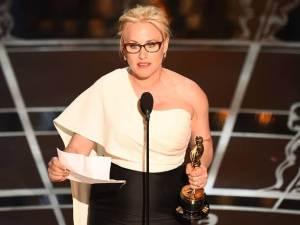
At a UN Women conference in March:
Cate Blanchette"Women make less than men for the same work in nearly every profession and industry, from entry-level positions to high-powered executives, no matter if you have a high-school diploma or a Ph.D. It's insidious, it's devastating."
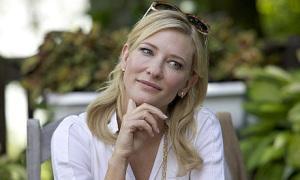
In the sameinterview with the quote everyone took to mean Blanchette was coming out as bi-sexual when in fact she simply meant she'd had plenty of female friends (not lovers), she also said this:
Helen Mirren"We have to push forward. What industry has parity pay for women? None. Why would we expect this industry to be any different?"
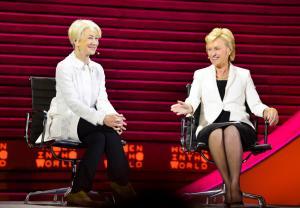 Appearing at Tina Brown's three-day Women in the World summit:
Appearing at Tina Brown's three-day Women in the World summit:
Emma Watson"People often say, 'It's so terrible that women don't have great roles in movies.' I say: Forget that. That doesn't matter. Change roles for women in life, and you will find the roles for women in drama."
The former Hermione Granger now serves as the UN Women's global goodwill ambassador:
"It is my belief that there is a greater understanding than ever that women need to be equal participants in our homes, in our societies, in our governments and in our workplaces. They know that the world is being held back in every way because they are not. Women share this planet 50-50, and they are underrepresented, their potential astonishingly untapped."

